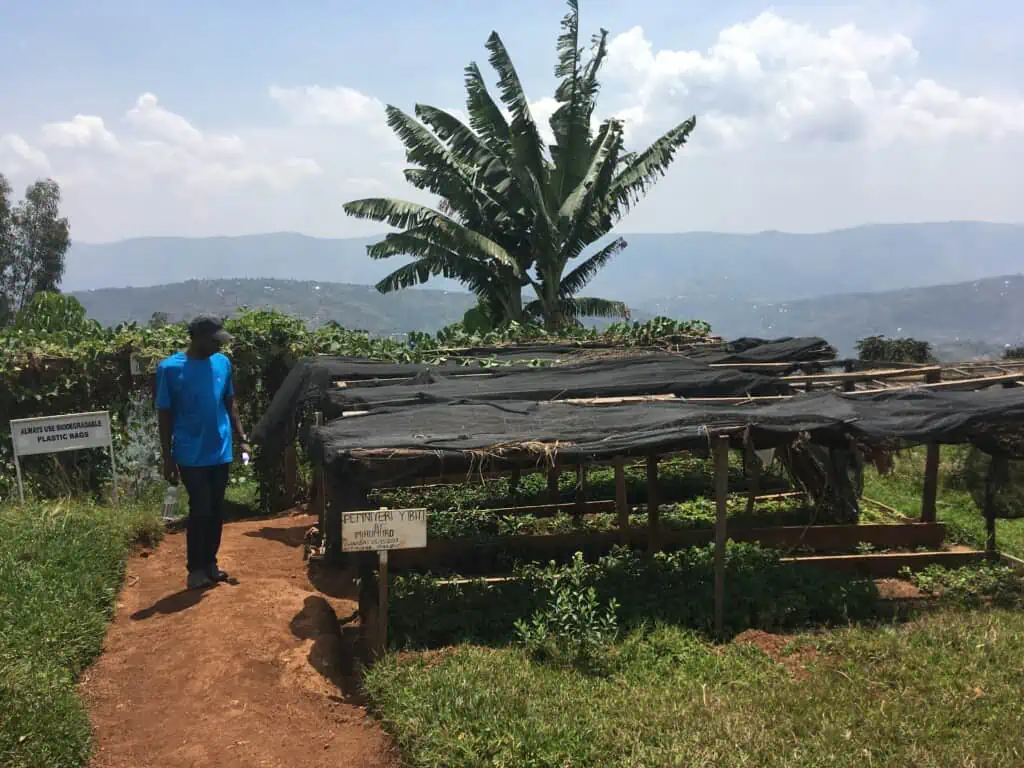
A farmer within the Dukundekawa Cooperative in Ruli, Rwanda, within the Gakenke District. Courtesy of Three Keys Espresso.
Though the time period “honest commerce” has been in use for over 75 years, it’s not linked to at least one particular group or group. Conceptually, honest commerce is a world motion that features producers, shoppers, numerous nongovernmental and nonprofit organizations, and for-profit companies; it’s a system designed to construct a extra equitable buying and selling mannequin for a variety of merchandise, together with espresso. In 1973, the primary fair-trade-identified espresso was bought from smallholder farms in Guatemala by a Dutch group referred to as Truthful Commerce Authentic. By 1988, a brand new honest commerce label, Max Havelaar, was established within the Netherlands. The identify got here from the protagonist within the 1860 novel Max Havelaar, who opposed the exploitation of espresso staff in Dutch colonies. The character fought in opposition to the corrupt Indonesian authorities on the island of Java, which was a Dutch colony on the time.
In 1997, Fairtrade Worldwide (initially the Fairtrade Labeling Group) was established to unite the fragmented honest commerce motion behind a typical set of requirements. A separate group referred to as FLOCERT, established in 2003 in Germany, makes use of Fairtrade Worldwide’s requirements to certify the manufacturing course of and audit the gross sales of merchandise. In 1998, Truthful Commerce USA (identified on the time as TransFair USA) was based and labored in collaboration with Fairtrade Worldwide for 13 years as one in every of 19 nationwide member organizations. In 2012, Truthful Commerce USA determined to separate from Fairtrade Worldwide, which allowed the group to make its personal guidelines.
The honest commerce system is designed to assist farmers achieve entry to a “honest” or economically sustainable worth for his or her merchandise. Espresso Overview final reported on honest trade-certified coffees in November 2015. Within the eight years since, we’ve got continued to see an evolution of the espresso trade, bringing higher-quality specialty espresso to a broader vary of espresso drinkers. Truthful trade-certified espresso is intrinsically certain to this enlargement. As this report demonstrates, we see a mirroring of all the pieces that’s taking place within the wider espresso market throughout the honest commerce phase.
This month, we thought-about practically 40 coffees that handed by way of a good commerce certification course of in one in every of many doable pathways and chosen 11 coffees for evaluate. A few of these are the highest-scoring amongst these we cupped, whereas others are grocery store manufacturers that scored decrease however are acquainted to many.
Ethiopia: A Truthful Commerce Powerhouse
The assortment of honest trade-certified coffees we evaluated this month, just like the specialty espresso market as a complete, expressed a variety of origins, taste attributes and roast ranges. The excellent news is that in the event you search for them, yow will discover excellent honest trade-certified coffees, such because the advanced and well-balanced 92-point Ethiopia Sidama Boa Bedegelo from Orange, Massachusetts-based roaster Dean’s Beans. The bundle bears the seal of the Truthful Commerce Federation, which is a commerce affiliation of honest commerce enterprises dedicated to equitable and sustainable buying and selling partnerships. Dean’s Beans’ roastmaster and inexperienced espresso purchaser, Brendan Walsh, says, “We’ve been dedicated to honest commerce since Dean based the corporate in 1993. As we see it, honest commerce certification is a much-needed help to tens of millions of small-scale farmers world wide.”
Maybe not surprisingly, 4 of the honest commerce coffees reviewed for this month’s report are from Ethiopia, an origin identified for its huge honest trade-certified cooperatives, a various vary of indigenous heirloom espresso varieties, and expressive, typically floral-toned taste profiles. One other 92-point Ethiopia espresso, Gerbicho Lela, with candy citrus and a tea rose-like floral high quality, was submitted by Noble Espresso Roasting in Ashland, Oregon.
The Complexity of Certification
Right here’s the place the honest commerce story turns into extra sophisticated. Though this Gerbicho Lela was produced by members of the honest trade-certified producers’ cooperative of the identical identify, Noble doesn’t keep honest commerce certification and due to this fact can not show a good commerce seal on its luggage. There are a variety of causes a roaster may select to not maintain honest commerce certification, together with administrative hurdles and prices. Nonetheless, Noble Espresso founder and CEO Jared Rennie says his firm “helps the work that the honest commerce motion has accomplished at origin and the various actual enhancements within the high quality of lifetime of tens of millions of individuals because the motion started a long time in the past.” He provides, “We purchase numerous espresso from honest trade-certified cooperatives all around the world, and we’re large proponents of the rules that information these cooperatives.”
There have been a handful of different roasters who despatched in espresso for this month’s report who, like Noble, bought honest trade-certified espresso and supported the rules of the motion with out themselves changing into a licensed hyperlink within the provide chain. Albuquerque, New Mexico-based Crimson Rock Roasters, then again, has been licensed by Truthful Commerce USA because the early 2000s. Crimson Rock’s 90-point natural-processed Natural/Truthful Commerce Ethiopia Sidamo confirmed flavors of strawberry, honey-roasted nuts and dessert wine. This espresso was produced by the Oromia Espresso Farmers Cooperative Union, and with each roaster and cooperative certification, your complete provide chain is transparently honest commerce.
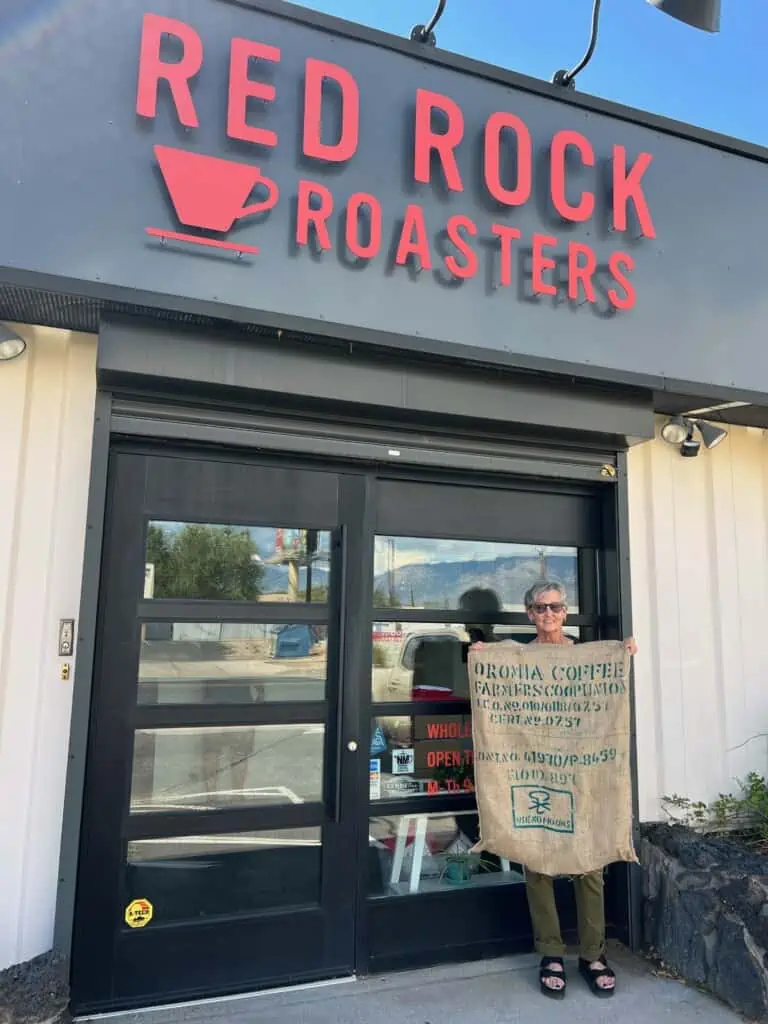
Albuquerque, New Mexico’s Crimson Rock Roasters is a good trade-certified roaster. Courtesy of Crimson Rock Roasters.
Range of Truthful Commerce Origins
Along with Ethiopia, we obtained entries from quite a lot of coffee-producing nations, together with a strong 91-point submission from Rwanda roasted by Three Keys Espresso in Houston, Texas. This energetic, fruit- and spice-toned Rwanda Reverb was produced by Rambagirakawa, an all-women subgroup of the Dukundekawa Cooperative. Though on the time of evaluate, Three Keys didn’t maintain honest commerce certification, CEO Kenzel Fallen says that after years of sourcing honest commerce espresso, the corporate simply signed ultimate certification documentation with Fairtrade America. Beforehand, she says, Three Keys was “of the mindset that as a result of we knew the costs paid had been properly past honest commerce minimums, we didn’t have to pay for a seal to show that. Nonetheless, many shoppers ask and search for a label for verification, so we determined this yr to pursue formal certification as a result of we wish to take a extra public stance to affirm our dedication and reassure our clients.” This notion of trusting the roaster appears to be a typical sentiment the place specialty roasters are involved. Customers can learn concerning the espresso and make assessments based mostly on worth, however the addition of a good commerce seal helps a roaster’s message through an goal third-party verification system.
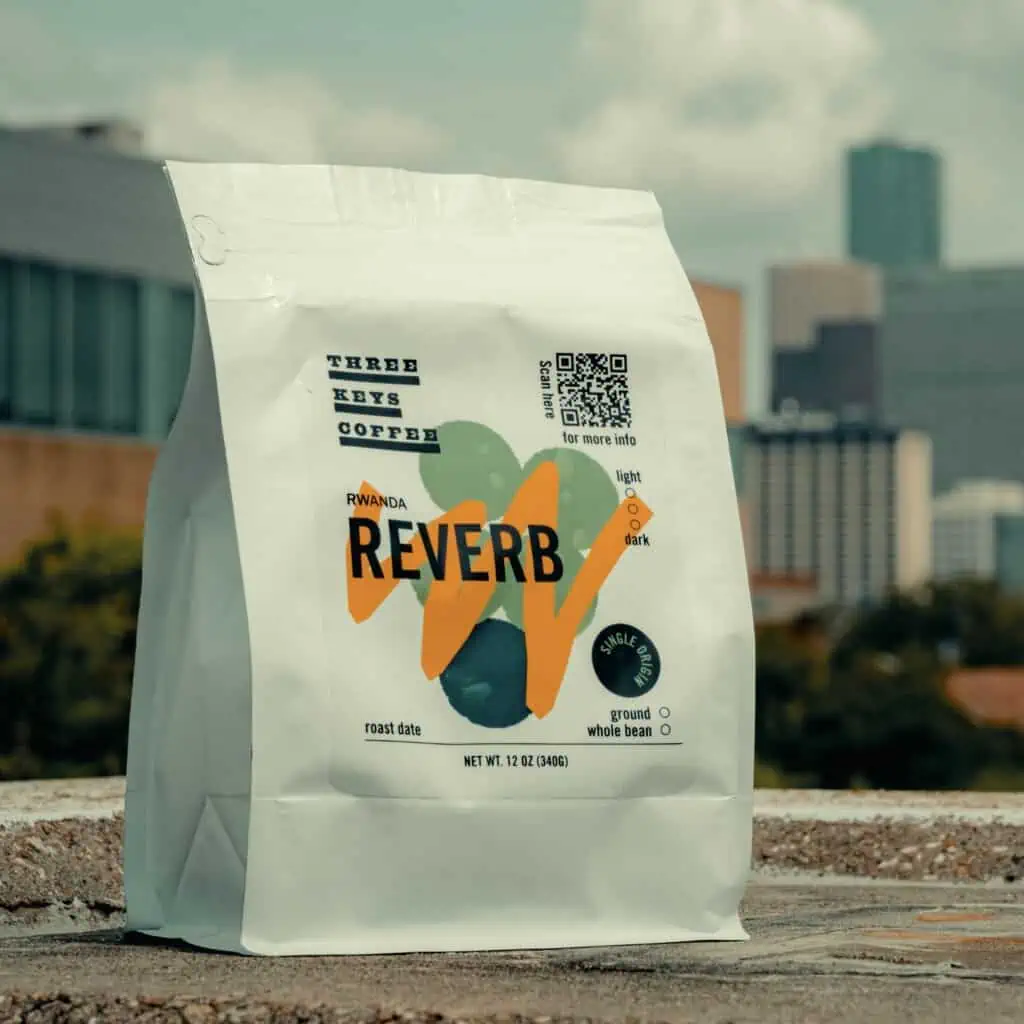
Three Keys Espresso Reverb is a good trade-certified espresso from Rwanda. Courtesy of Three Keys.
From Latin America, the 91-point Guatemala Tojquia, roasted by Wonderstate Espresso in Viroqua, Wisconsin, is a single-producer lot that displays flavors of star anise and caramel. The farmer who produced the espresso is a member of a good trade-certified co-op, and this lot was bought beneath honest commerce phrases. The roastery, nevertheless, is just not honest trade-certified, so you’ll not discover a honest commerce image on the bag. Wonderstate co-founder Caleb Nicholes says, “Now we have developed our personal minimal worth for all of our coffees … and have dedicated to growing our minimal by 5 cents every year to cowl rising prices of manufacturing.”
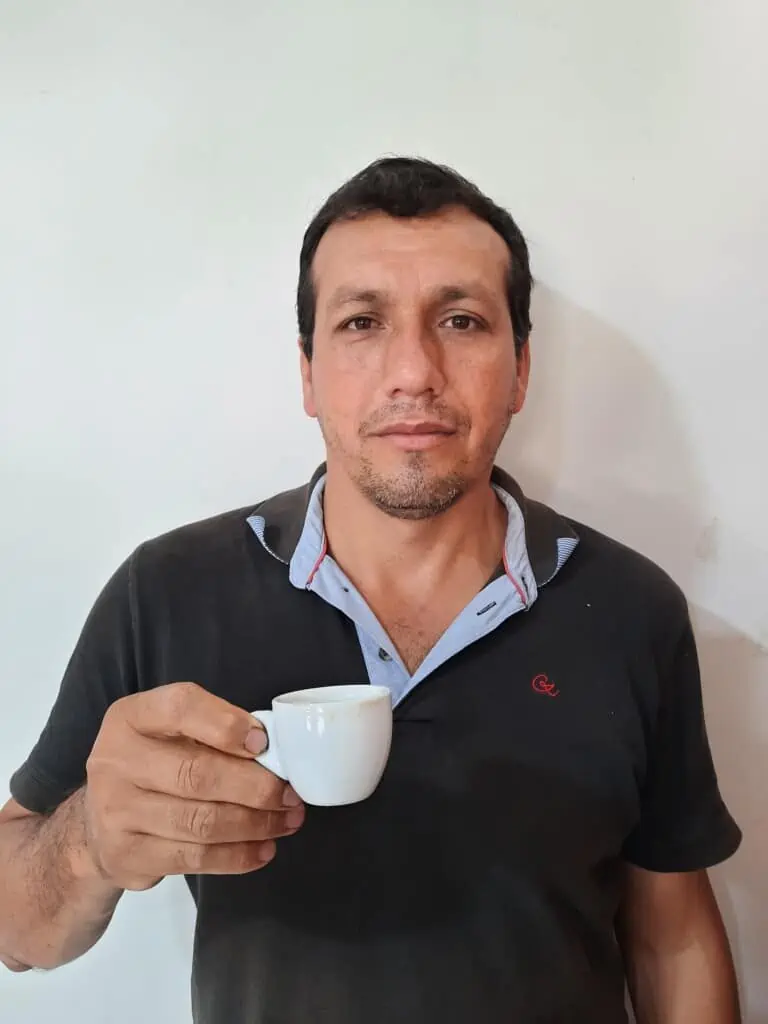
Homer Alarcon is the producer of Amavida’s Peru Gesha Pure. Courtesy of Amavida.
Like Wonderstate, Santa Rosa Seashore, Florida-based Amavida Espresso doesn’t keep honest commerce certification, however its berry jam and sugar-sweet 91-point Peru Gesha Pure was additionally produced by a single farmer who’s a member of a big honest trade-certified cooperative. Not solely are these coffees scrumptious, however they’re examples of honest trade-certified coffees from a various vary of manufacturing nations.
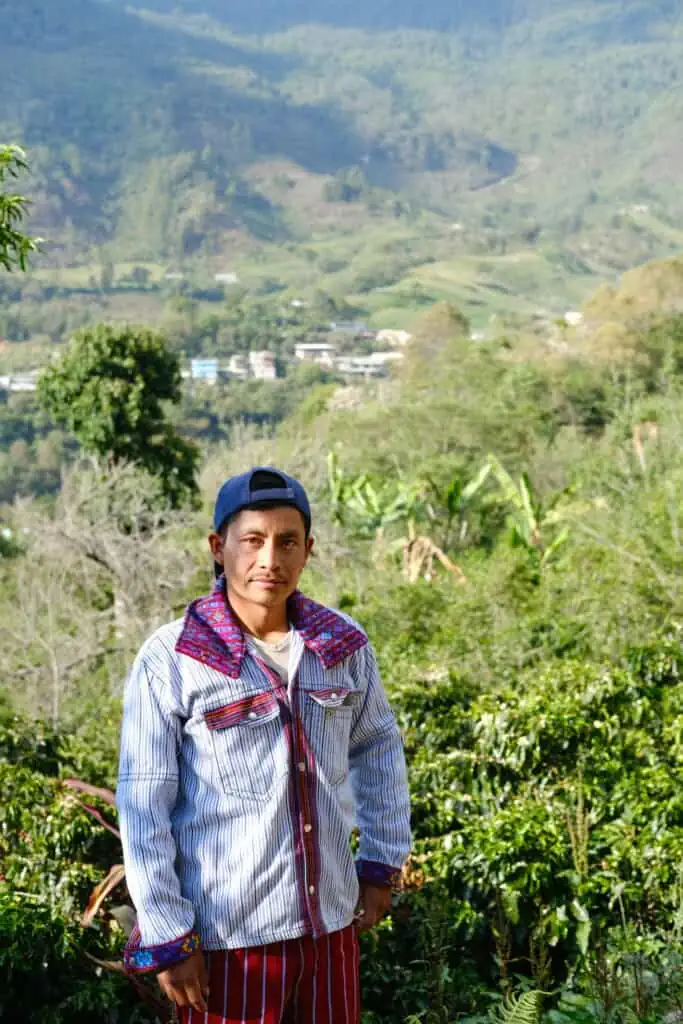
Porfirio Velasquez is the producer of Wonderstate Espresso’s Guatemala Tojquia, from the Huehuetenango area. Courtesy of Wonderstate.
Talking of variety, we evaluated a small variety of honest commerce coffees from the Indonesian island of Sumatra, one other residence for big honest trade-certified cooperatives. A kind of tons rose above the remainder, the deep-toned, accessible and subtly savory Sumatra Highlands espresso from Milwaukee, Wisconsin’s Colectivo Espresso (reviewed at 87 factors). This espresso was grown within the Gayo Highlands on the northern tip of Sumatra within the Aceh Province by the espresso farmers’ co-op Kopepi Ketiara, and Colectivo’s web site shows the Truthful Commerce USA seal.
A extra uncommon entry was the 92-point Kenya Endebess from Seattle, Washington-based Fulcrum Espresso Roasters. Well-known for its washed-process coffees, Kenya produces only a few coffees dried in the entire fruit. This espresso was produced by members of the Othaya Farmers Cooperative Society Restricted. Once more, with this espresso, the co-op holds honest commerce certification however the roaster doesn’t. These coffees spherical out the geographic circle of honest commerce origins and additional display the great vary of flavors that may be discovered throughout the honest commerce subcategory of specialty espresso.
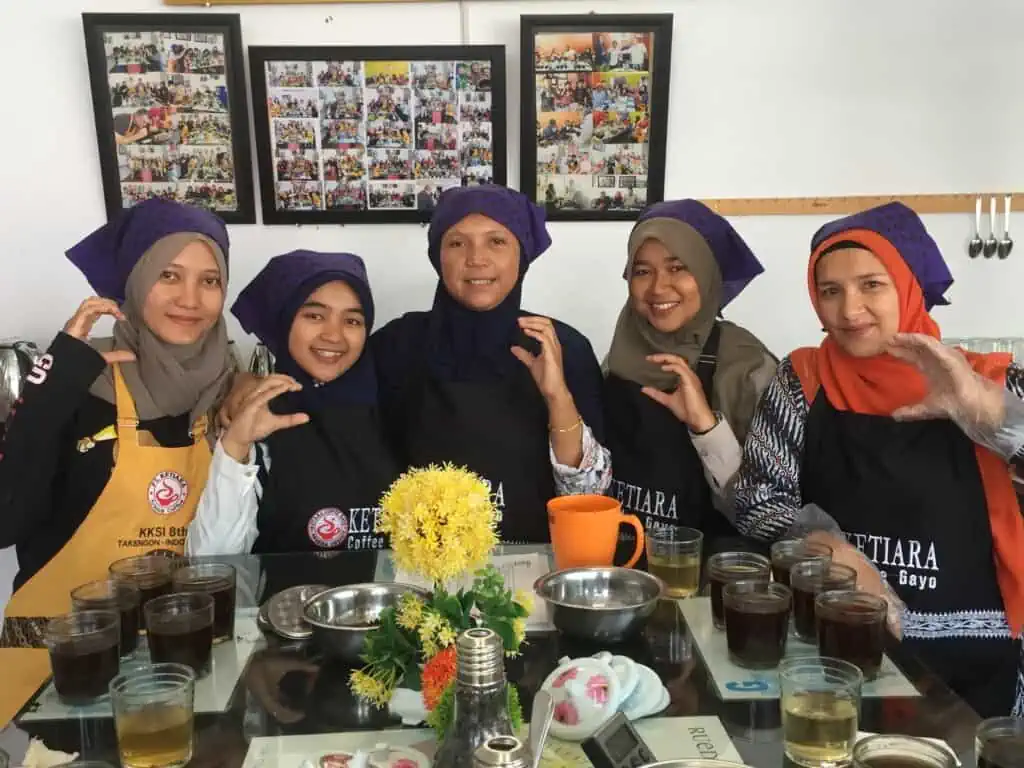
Ladies farmers of the Koperasi Ketiara Cooperative within the Gayo Highlands of Sumatra, Indonesia.
Truthful Commerce and Nationwide Chain Markets
As soon as a distinct segment product discovered solely in choose pure meals shops, honest commerce espresso is now extensively obtainable to buyers on-line and in conventional grocery shops and supermarkets, notably in North America and Europe. We’d be remiss to disregard the assortment of honest commerce coffees that may be discovered at a few of these giant nationwide grocery chains. Those that search honest trade-certified espresso in grocery and massive field shops are usually introduced with a small assortment of typically darker-roasted choices. Simply as with non-certified coffees, it is tougher to search out lighter-roasted single-origin honest commerce choices. Though these subsequent three coffees don’t dazzle in the best way that among the earlier samples do, they’re serviceable selections that many espresso drinkers will definitely admire.
We begin with a pair of home manufacturers that may simply be discovered on the ubiquitous Complete Meals Market. Allegro Espresso, the Thornton, Colorado-based specialty espresso subsidiary of Complete Meals, roasted the crisply chocolaty 85-point Colombia El Premio de Timana. One other Complete Meals entry comes from the corporate’s 365 home model, the straightforward however softly candy 82-point Hometown Mix. Curiously, that is one in every of just some blends that got here throughout our cupping desk, but it was an instance of an easy-drinking, value-forward honest trade-certified espresso amongst different blends that had been so darkly roasted that nothing however charred flavors remained within the cup. Each of those extensively obtainable coffees had been bought on the Complete Meals Market in Oakland, California, and are probably obtainable in lots of different places. In neighboring Alameda, California, we bought a few honest commerce coffees from Dealer Joe’s, together with the home model’s Natural Truthful Commerce Shade Grown Ethiopian, which we rated 83. Though missing particular origin particulars, this staunchly dark-roasted espresso yields mushy hints of dried fruit, together with extra pronounced flavors of flippantly smoky walnut and carob.
All three of those coffees displayed the Truthful Commerce USA brand as proof of certification. Nonetheless, along with certification, the retail worth is commonly one of many solely guideposts shoppers have for figuring out {that a} honest worth was paid by the roaster. When a 12-ounce bundle of espresso is offered for a paltry $9.99 (on this case, the aforementioned Dealer Joe’s Ethiopia), even with a good commerce seal, the value calls into query the doable compensation obtained by the individuals who grew the espresso.
Current Truthful Commerce Information
On Aug. 1, 2023, Fairtrade Worldwide applied a change to its pricing pointers for espresso. For the primary time in a dozen years, the ground worth and natural premium for honest trade-certified coffees had been elevated. With the price of dwelling regularly escalating yr over yr, and the newer world inflationary spike all of us have been witnessing, there are some who argue that this enhance may be very late in coming. It’s, nevertheless, a sudden and important enhance in the price of items that stunned many honest commerce roasters and importers.
For washed Arabica espresso, the baseline worth will enhance by 29 %, with a further 33 % enhance for the natural premium. There may be additionally a extra modest however nonetheless important 19 % enhance for lower-valued Robusta coffees. What does this boil all the way down to in {dollars} and cents? For honest commerce and organic-certified washed Arabica espresso, the ground worth has gone up from $1.70 USD per pound of inexperienced espresso to $2.20, with a further 20 cents per pound social premium offered to the cooperative to be spent in no matter approach the group decides. This new $2.40 base worth for honest trade- and organic-certified Arabica espresso is free of charge on board (FOB) phrases, which excludes prices related to insurance coverage, storage, transportation, importer margin, curiosity and certification charges.
For context, over the previous 5 years, the value for business (non-specialty) Arabica espresso traded on the risky New York Board of Commerce commodities market has fluctuated dramatically between $0.87 and $2.55 per pound. Irrespective of how low the commodity market drops, honest trade-certified growers are assured a minimal worth that’s meant to cowl the price of manufacturing. During times of excessive commodities pricing, honest commerce costs usually enhance because of provide and demand dynamics from inside and outdoors of the honest commerce system.
Disagreement Amongst Truthful Commerce-Certifying Our bodies
To complicate issues, the adjustments Fairtrade Worldwide has put into place weren’t accepted by Truthful Commerce USA, the first certifying company in the USA. After conferring with stakeholders, Truthful Commerce USA determined to not implement the value enhance not less than by way of the tip of 2023. Initially, Truthful Commerce USA had voluntarily chosen to simply accept Fairtrade Worldwide’s worth construction, however now the organizations are diverging. Truthful Commerce USA’s founder, Paul Rice, says, “A big enhance in Truthful Commerce worth and premium at the moment would severely scale back demand and in the end harm the very farmers and households that we intention to serve.” The 2 organizations proceed to share a typical purpose of empowering farmers and enabling them to develop sustainable livelihoods for themselves and their communities.
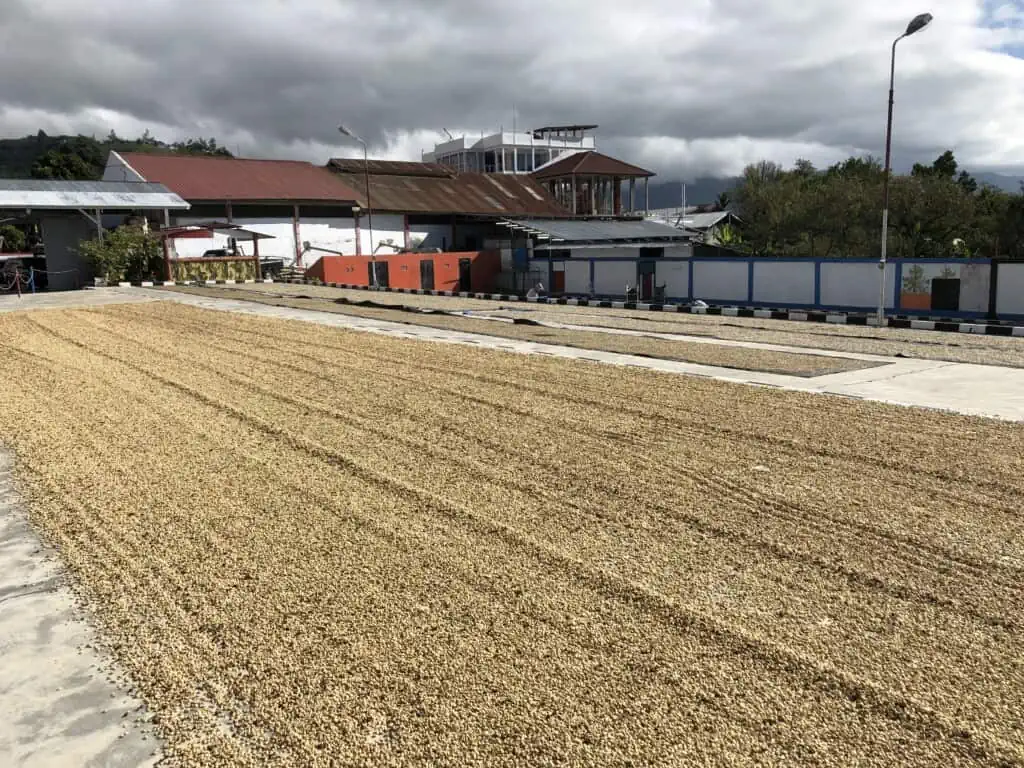
Espresso drying within the solar on concrete patios on the Dukundekawa Cooperative in Ruli, Rwanda, within the Gakenke District.
Though deciphering honest commerce packages is changing into extra nuanced, shopping for licensed espresso continues to be a approach to help a motion that helps farmers obtain sustainability in enterprise. One of many honest commerce motion’s best challenges has been to extend demand for licensed coffees. At the moment, lots of the 900,000 FLOCERT-certified espresso farmers positioned in 31 totally different nations promote solely a portion of their produce beneath honest commerce phrases. The rest is offered into the market at prevailing costs, which generally fall under the price of manufacturing. Selecting to purchase espresso from a roaster that pays extra to the grower, whether or not by way of the honest commerce system or not, is a technique to make sure espresso farmers are getting a good shake.
If the value of espresso in your grocery retailer or on-line is extraordinarily low, you might be positive the farmer didn’t obtain a dwelling wage for his or her labor and experience. As we will see from the vast majority of coffees reviewed this month, high-quality espresso calls for greater costs, whether or not the roaster is licensed beneath the honest commerce system or not. Not all coffees, nevertheless, even licensed coffees, have corresponding costs that point out honest compensation for the producer. Customers who care that the individuals who produce espresso are getting a good worth have to do their homework. If the value of a good commerce espresso appears low, don’t be afraid to ask the roaster for extra particulars.

